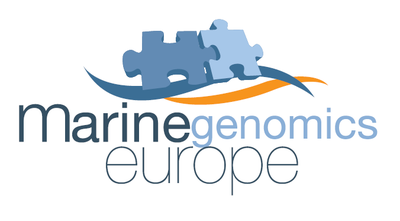Marine Sciences for a Sustainable Future
Contents
The European Flagship in Marine Sciences for a Sustainable Future
The Network of Excellence (NoE) Marine Genomics Europe (MGE; 2004-2008) integrates European interests in fundamental research on marine genomics, transfers knowledge and technology, cooperates with policy makers and enters into dialogue with society.
The oceans, the cradle of life, contribute fundamentally to the Earth’s functioning through their productivity, biomass, diversity and sheer mass. Over 95% of the volume of the biosphere, including a wide range of extreme environments is occupied by marine organisms, which have evolved mechanisms for adaptation and survival. Inshore and offshore waters provide resources and services estimated at 60% of the total economic value of the biosphere, two thirds coming from coastal ecosystems. The physics, chemistry, and the living organisms of the oceans drive global climate. A comprehensive knowledge of marine life is essential for sustainable resource management and the economic support of human societies.
The science of genomics - the study of the structure, function, evolution and diversity of genes, and related approaches - is significantly changing our perspective of the living ocean and is providing us with the opportunities to understand the fundamentals of life by studying diverse and numerous marine ecosystems, organisms and populations, together with the evolution of development, biochemical and physiological functions. Genomics opens the doors to answering complex questions, many never imagined before or if considered, were virtually unanswerable. Genomics serves as a focus to integrate biogeochemistry, evolution, climate, resource management and the socio-cultural identity of mankind. Developing and spreading the use of genomics for the investigation of the biology of marine organisms are the aims of the European NoE Marine Genomics Europe.
MGE is a major initiative funded over five years by the European Community, involving 44 partners and linking life sciences, environment, ecology, bioinformatics, and high through-put genomic technologies within a multilateral European environment. MGE is devoted to the development, utilization and spreading of high through-put approaches for the investigation of the biology of marine organisms. This ambitious undertaking has made possible the integration of a previously fragmented scientific community by sharing skills and platforms,as well as through teaching and training. Benefits include large scale sequencing projects, phylogenomic studies and the application of genomics technologies to functional, comparative and environmental issues in marine biology.
Briefly, Marine Genomics Europe is involved in:
- The collection of fundamental knowledge on the functioning of the oceans;
- Knowledge transfer and technology translation between high-throughput genomics, marine biology,oceanographers, industry and society;
- Cooperating with policy makers;
- Transparency and dialogue with society.
Marine Genomics Europe - Priorities
MGE’s priorities are embedded in short-, medium andlong-term strategic priorities of Europe and are focusing on the understanding and sustainable exploitation of the ocean. We have identified four strategic priorities of special interest over the next decade in order to understand the complexity of marine ecosystems and to serve the world community.
1. Changing environments:
the ocean and its biota are changing continuously, be it under the influence of natural events or the growing impact of man. Particularly the latter is of increasing concern for society. Here knowledge is the key to decision and mitigation. Genomics has become critical for understanding biogeochemical processes.
2. Evolution of biodiversity:
the rate of change in global biodiversity is increasing at an alarming rate. Either species disappear or novel species (exotics) are reported in new habitats. The genome is a repository of historical change and hence a source for predicting future developments. Marine ecosystems are composed of species whose interactions affect the innumerable goods and services that benefits man. Genomics is a practical tool to reveal the many unseen biota.
3. Living resources:
the ocean is a huge source of food. Most crucial, it guarantees a minimum level of subsistense for the world’s poor. Unfortunately, most (shell)fish stocks are overexploited and some are close to collapse. New fisheries management approaches can greatly benefit from genomic information.
4. New biological resources:
biomedical, industrial and societal applications can expect much from blue biotechnology. So far the potential locked in the ocean has failed to be fully exploited. Marine genomics provides a new approach to unlocking new resources from microbes to whales.
Steps towards the realisation of priorities
The realisation of these strategic priorities demands a number of steps.
A. Integrated science:
with the growth of molecular sciences, inter- and trans-disciplinary approaches are key, e.g., between marine genomics, ecosystem sciences (oceanography, global earth observation) and health. Joint projects, small and large alike, realised through joint funding, are essential for success. Systems biology is an example of how science is integrating.
B. Technological support:
progress in (marine)genomics is based on sustained technological support. Topics which come to mind include the establishment of marine model systems, the exploitation of large metagenomic data sets, postgenomics research, bioprospecting and infrastructures for blue biotechnology and information management.
C. Development of research capacities:
the increasing data flow on marine life through remote sensing, either from space or from semi-permanent stations in the ocean, offer ocean sciences immense opportunities for a better knowledge of poorly accessible environments. Automated monitoring, combined with onshore validation, experimentation and data processing will provide the necessary data to understand the significance of microbial remineralisation, ocean-wide primary productivity and the impact of removal of top predators through fishing.
D. Links with society - education and training:
appreciation for the ocean will directly benefit from education and training in ocean sciences and management. Marine scientists are eager to promote their science and the environment they work in. As the ocean covers most of the globe, a critical mass of marine researchers is translated into larger numbers of marine scientists and policy makers.
E. Science mediation:
organisations such as Marine Genomics Europe are perfect mediators between funding agencies, high-throughput technology platforms, specialist communities and the public.
References



